Related Research Articles

Lesbian, gay, bisexual, and transgender (LGBT) people in Belarus face significant challenges not experienced by non-LGBT residents. Although same-sex sexual activity is legal in Belarus, gay and lesbian rights in the country are otherwise severely limited and homosexuality remains highly stigmatized in Belarusian society. Households headed by same-sex couples are not eligible for the same legal protections available to opposite-sex couples. Belarus provides no anti-discrimination protections for LGBT people, nor does it prohibit hate crimes based on sexual orientation and gender identity. Many Belarusian people believe that homosexuality is a psychiatric illness, and many LGBT persons in Belarus tend to hide their sexual orientation in public. Those who are "out" face harassment, violence and physical abuse.
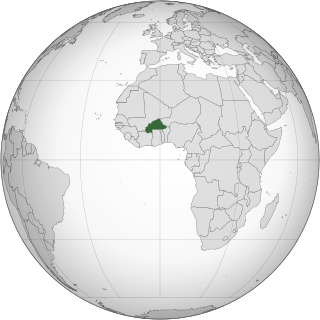
Lesbian, gay, bisexual, and transgender (LGBT) people in Burkina Faso face legal issues not experienced by non-LGBT citizens. Although same-sex sexual acts are legal for both men and women in Burkina Faso, there is no legal recognition of same-sex marriage or adoption rights.

Lesbian, gay, bisexual, and transgender (LGBT) people in the Islamic Emirate of Afghanistan face severe challenges not experienced by non-LGBT residents. Afghan members of the LGBT community are forced to keep their gender identity and sexual orientation secret, in fear of violence and the death penalty. The religious nature of the country has limited any opportunity for public discussion, with any mention of homosexuality and related terms deemed taboo.

Lesbian, gay, bisexual, and transgender (LGBT) persons in Jamaica face legal and social issues not experienced by non-LGBT people. Consensual sexual intercourse between same-sex partners is legally punishable by imprisonment.

Lesbian, gay, bisexual, and transgender (LGBT) rights in Argentina rank among the highest in the world. Upon legalising same-sex marriage on 15 July 2010, Argentina became the first country in Latin America, the second in the Americas, and the tenth in the world to do so. Following Argentina's transition to a democracy in 1983, its laws have become more inclusive and accepting of LGBT people, as has public opinion.

Lesbian, gay, bisexual, and transgender (LGBT) rights in Angola have seen improvements in the early 21st century. In November 2020, the National Assembly approved a new penal code, which legalised consenting same-sex sexual activity. Additionally, employment discrimination on the basis of sexual orientation has been banned, making Angola one of the few African countries to have such protections for LGBT people.

Lesbian, gay, bisexual, and transgender (LGBT) people in Nicaragua face legal challenges not experienced by non-LGBT residents. Both male and female types of same-sex sexual activity are legal in Nicaragua. Discrimination based on sexual orientation is banned in certain areas, including in employment and access to health services.

Lesbian, gay, bisexual, and transgender (LGBT) people in Honduras face legal challenges not experienced by non-LGBT residents. Both male and female types of same-sex sexual activity are legal in Honduras.
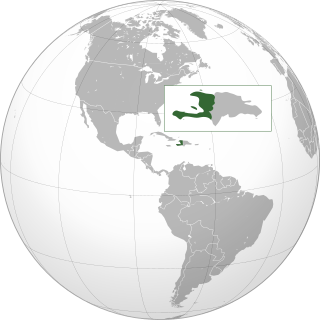
Lesbian, gay, bisexual, and transgender (LGBT) persons in Haiti face social and legal challenges not experienced by non-LGBT residents. Adult, noncommercial and consensual same-sex sexuality is not a criminal offense, but transgender people can be fined for violating a broadly written vagrancy law. Public opinion tends to be opposed to LGBT rights, which is why LGBT people are not protected from discrimination, are not included in hate crime laws, and households headed by same-sex couples do not have any of the legal rights given to married couples.
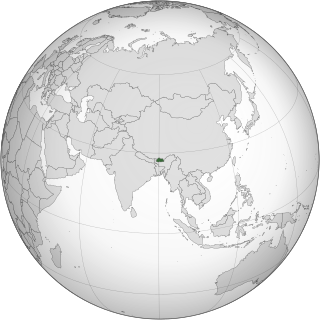
Lesbian, gay, bisexual and transgender (LGBT) people in Bhutan face legal challenges that are not faced by non-LGBT people. Same-sex sexual activity was decriminalised in Bhutan on 17 February 2021.

Lesbian, gay, bisexual, and transgender (LGBT) people in Somalia face severe challenges not experienced by non-LGBT residents. Consensual same-sex sexual activity is illegal for both men and women. In areas controlled by al-Shabab, and in Jubaland, capital punishment is imposed for such sexual activity. In other areas, where Sharia does not apply, the civil law code specifies prison sentences of up to three years as penalty. LGBT people are regularly prosecuted by the government and additionally face stigmatization among the broader population. Stigmatization and criminalisation of homosexuality in Somalia occur in a legal and cultural context where 99% of the population follow Islam as their religion, while the country has had an unstable government and has been subjected to a civil war for decades.
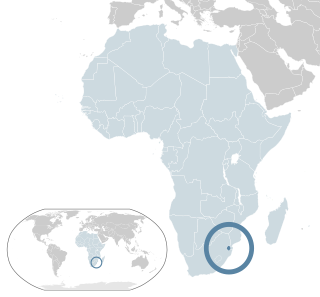
Lesbian, gay, bisexual, and transgender (LGBT) people in Eswatini have limited legal rights. According to Rock of Hope, a Swati LGBT advocacy group, "there is no legislation recognising LGBTIs or protecting the right to a non-heterosexual orientation and gender identity and as a result [LGBT people] cannot be open about their orientation or gender identity for fear of rejection and discrimination". Homosexuality is illegal in Eswatini, though this law is in practice unenforced. According to the 2021 Human Rights Practices Report from the US Department of State, "there has never been an arrest or prosecution for consensual same-sex conduct."

Lesbian, gay, bisexual, transgender, intersex, non-binary and otherwise queer, non-cisgender, non-heterosexual citizens of El Salvador face considerable legal and social challenges not experienced by fellow heterosexual, cisgender Salvadorans. While same-sex sexual activity between all genders is legal in the country, same-sex marriage is not recognized; thus, same-sex couples—and households headed by same-sex couples—are not eligible for the same legal benefits provided to heterosexual married couples.
The initialism LGBT is used to refer collectively to lesbian, gay, bisexual, and transgender (LGBT) people and members of the specific group and to the community (subculture) that surrounds them. This can include rights advocates, artists, authors, etc.

Lesbian, gay, bisexual, and transgender (LGBT) people in Guatemala face legal challenges not experienced by non-LGBT residents. Both male and female forms of same-sex sexual activity are legal in Guatemala.
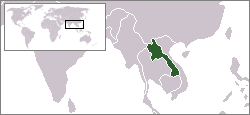
Lesbian, gay, bisexual and transgender (LGBT) rights in Laos go unreported and unnoticed. While homosexuality is legal in Laos, it is very difficult to assess the current state of acceptance and violence that LGBT people face because of government interference. Numerous claims have suggested that Laos is one of the most tolerant communist states. Despite such claims, discrimination still exists. Laos provides no anti-discrimination protections for LGBT people, nor does it prohibit hate crimes based on sexual orientation and gender identity. Households headed by same-sex couples are not eligible for any of the rights that opposite-sex married couples enjoy, as neither same-sex marriage nor civil unions are legal.

Lesbian, gay, bisexual and transgender (LGBT) people in Liberia face legal and social challenges which others in the country do not experience. LGBT people in Liberia encounter widespread discrimination, including harassment, death threats, and at times physical attacks. Several prominent Liberian politicians and organizations have campaigned to restrict LGBT rights further, while several local, Liberian-based organizations exist to advocate and provide services for the LGBT community in Liberia. Same-sex sexual activity is criminalized regardless of the gender of those involved, with a maximum penalty of three years in prison, and same-sex marriage is illegal.
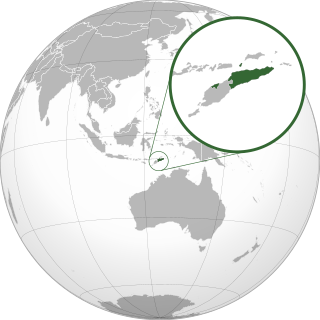
Lesbian, gay, bisexual, and transgender (LGBT) people in East Timor face legal challenges not experienced by non-LGBT residents. Both male and female same-sex sexual activity are legal in East Timor, but same-sex couples and households headed by same-sex couples are not eligible for the same legal protections available to opposite-sex married couples.
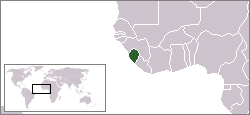
Lesbian, gay, bisexual, and transgender (LGBT) people in Sierra Leone face legal challenges not experienced by non-LGBT residents. Male same-sex sexual activity is illegal in Sierra Leone and carries a possible penalty of life imprisonment, although this law is seldom enforced.

The following outline offers an overview and guide to LGBT topics.
References
- ↑ "Where is it illegal to be gay?". BBC News. 10 February 2014. Retrieved 23 February 2014.
- ↑ Aguilar, Indyra (9 September 2014). "IMPUNITY AND VIOLATION OF JUDICIAL GUARANTEES OF THE HUMAN RIGHTS OF LESBIAN, GAY, BISEXUALS, TRANSGENDER AND INTERSEX PERSONS IN CRIMINAL CASES IN HONDURAS" (PDF). cattrachas.org. Archived from the original (PDF) on 7 November 2019. Retrieved 6 November 2019.
- ↑ Manuel Fernandez-Alemany & Stephen O. Murray, "Heterogender Homosexuality in Honduras" (Lincoln, NE: Writers Club Press, 2002), ISBN 0-595-22681-7
- ↑ Tucker, Duncan (5 April 2016). "Rainbow warriors: Attacks and killings of LGBT activists in Honduras". Index on Censorship. 45 (1): 72–75. doi: 10.1177/0306422016643026 . ISSN 0306-4220.
- ↑ Cattrachas (2018). "Informe Sobre Muertes Violentas de la comunidad LGTTBI" (PDF). cattrachas.org. Archived from the original (PDF) on 7 November 2019. Retrieved 5 November 2019.
- ↑ Pizzi, Julia (8 October 2006). "Shadow report on lesbian, gay, bisexual and transgender rights in Honduras" (PDF). cattrachas.org. Archived from the original (PDF) on 7 November 2019. Retrieved 6 November 2019.
- ↑ García Trujillo, Odalys; Paredes, Mayté; Sierra, Manuel (July 1998). "VIH/SIDA: Análisis de la Evolución de la Epidemia en Honduras" (PDF). Universidad de Costa Rica.
